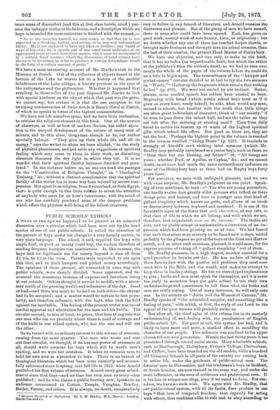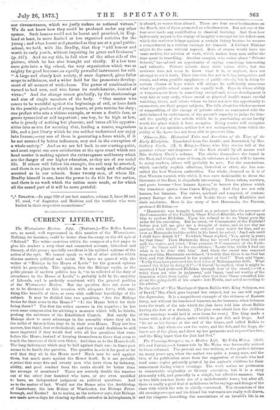PUBLIC SCHOOLS' ETHICS.*
A WEEK or two ago we happened to be present at an animated discussion over a circular which had been sent out by the head master of one of our public schools. It called the attention of the parents of boys under his charge to a very homely matter, in very plain language. The school, it said, supplied the boys with ample food, as good as money could buy, the custom therefore of sending frequent hampers was mischievous. In like manner, the boys had no legitimate use for money beyond a sum of from £1 108. to £2 in the term. Parents were requested to act upon this hint, and to limit hampers and pocket money accordingly. The opinions of those present, all connected in some way with public schools, were sharply divided. Some approved, and de- nounced the monstrous increase of expense and luxurious living at our schools. Others thought it unwise to meddle with a neces- sary result of the growing wealth and refinement of the day. Good or bad—and there was much to be said on both sides—the change had to be accepted ; and a master would be certain to lose popu- larity, and therefore influence, with the boys, who took the field against the inevitable. The feeling of the present writer was one of cordial approval and admiration for the man and his battle. The circular seemed, to him at least, to prove, that here at any rate was one man who can see precisely where there is need of courage and of the knife in our school system, who has the one and will use the other.
So we turned with no ordinary interest to this volume of sermons, coming from the same quarter. The man who wrote and sent out that circular, we thought, if he has any power of utterance at all, should write sermons for boys which will be worth men's reading, and we were not mistaken. It takes no common man to hold his own now as a preacher to boys. There is no branch of theological literature which has been more earnestly and success- fully cultivated since it sprang into full life in 1829, when Arnold published his first volume of sermons. Almost every great school- master since that time—and no time has ever seen so many—has published ; and he who claims a public hearing now, speaks to an audience accustomed to Cotton, Temple, Vaughan, Bradley, Butler, Farrar, and others. It is always, no doubt, comparatively
• Sermons 'Preached at Ilaileybury. By E. H. Bradby, HA., Master. Macmillan and Co.
London:
easy to follow in any branch of literature, and Arnold remains the discoverer and pioneer. But of the group of men we have named, there is none who could have been spared. Each has given us good work, several work of rare beauty, force, or originality ; but we doubt whether any one of them has touched deeper chords, or
more freshness and strength into his school sermons, than the last of their number, the present Head Master of Haileybury.
We have one objection, and one only, to make to the book, that it has no index (an unpardonable fault, but which lies rather- at the publisher's than the author's door), so we had to turn over nearly the whole of the pages of the volume before we could fix on a title to begin upon. The remembrance of the " hamper and pocket-money" circular decided us at last to try the two sermons on "Waste," "Gather up the fragments which remain that nothing be lost" (p. 289). We were not misled by our instinct. Better, plainer, more needful speech has seldom been uttered to boys. Beginning with bread (which public school boys treat as if it grew on every bush, ready baked), he asks, what would any man„ unused to schools, but familiar with the truth that little things- are often great indications of character, think of " our society," if he were to pass down the school hall, and see the tables as they are left after the morning or evening meal ? Then from daily bread he carries his hearers up to waste of the highest spiritual gifts which school life offers. But good as these are, they are- not the best. Perhaps the highest point in the volume is reached in the sermon entitled "Going Home" (p. 150). It reminds us strongly of Arnold's most striking later sermons (which Mr.. Bradby may probably have heard as a junior boy), such as those on " Hast thou but one blessing, my father?" or, " All things are- yours ; whether Paul, or Apollos, or Cephas," &c., and we cannot doubt, must have had much the same extraordinary influence on some of the Haileybury boys as those had on Rugby boys forty years since.
For ourselves, we note with unfeigned pleasure, and we own with some surprise, Mr. Bradby's judgment on one point. Speak- ing of true manliness, he says :—" You who are young yourselves, can hardly realise how greatly older persons who reflect on these things prize, and honour, and love in younger men that kind of gallant simplicity which knows no guile, and allows of no break- or discontinuity between boyhood and manhood. It is one of the favourable signs of the times that such characters, at any rate, in that class of life to which we all belong, and with which we are, therefore, best acquainted, seen on the increase." The italics are ours, and we gladly accept so authoritative a correction of an im- pression which had been growing on us of late. \Ve had feared that such characters were scarcely to be found now-a-days, misled probably by the glimpses we get of the boys at the Eton and Harrow match, and on other such occasions, planned, it would seem, for the- express purpose of taking all " gallant simplicity" out of them.
Mr. Bradby possesses, in a high degree, another essential for a- good preacher to boys in our day. He has no fear of bringing them face- to face with the puzzles and problems they must soon meet with in the Bible and the world, and makes no attempt to keep them in leading-strings. He has no stereotyped explanations to give ; books and men must speak for themselves, and it is never too early to accustom boys (or girls either) to use their own understandings and consciences to tell them what the books and men are really saying. Out of many instances, we will only note- one. In the sermon on " Jesus and the Woman of Canaan," Mr. Bradby speaks of "the astonished surprise, and something like a- feeling of pain," with which, at first, the reply of our Lord to the appeal of the poor woman will probably strike us.
But after all, the chief value of this volume lies in its masterly understanding of, and dealing with, the peculiarities of English, public-school life. For good or evil, this system has had, and is likely to have more and more, a marked effect in moulding the character of our people. This influence was confined to the upper classes till our own generation. Within the last thirty years it has- penetrated through several social strata. Many admirable schools, such as Marlborough, Haileybury, Fettye's College, Cheltenham, and Clifton, have been founded on the old models, while a hundred old Grammar Schools in all parts of the country are coming back to active life, under the guidance of public-school men. The farmers' sons in Devonshire, and the tradesmen's boys in Bedford, or South London, are now trained in the same way, and under the same influences, as the sons of noblemen and professional men. It is too late to retrace our steps, even if we cared to do so. For our- selves, we have no such wish. We agree with Mr. Bradby, that our public-school system, with all its faults, does produce in our boys " that love of tempered freedom, that capacity for acting
with others, that readiness alike to rule and to obey according to
our circumstances, which we justly reckon as national virtues." We do not know bow they could be produced under any other system. Such lessons could not be learnt and practised, in Eng- land at least, in more limited or less organised societies for the young ; and when learnt and practised as they are at a good public- school, we hold, with Mr. Bradby, that they "add honour and worth to early youth, without impairing its grace and freshness "



































 Previous page
Previous page